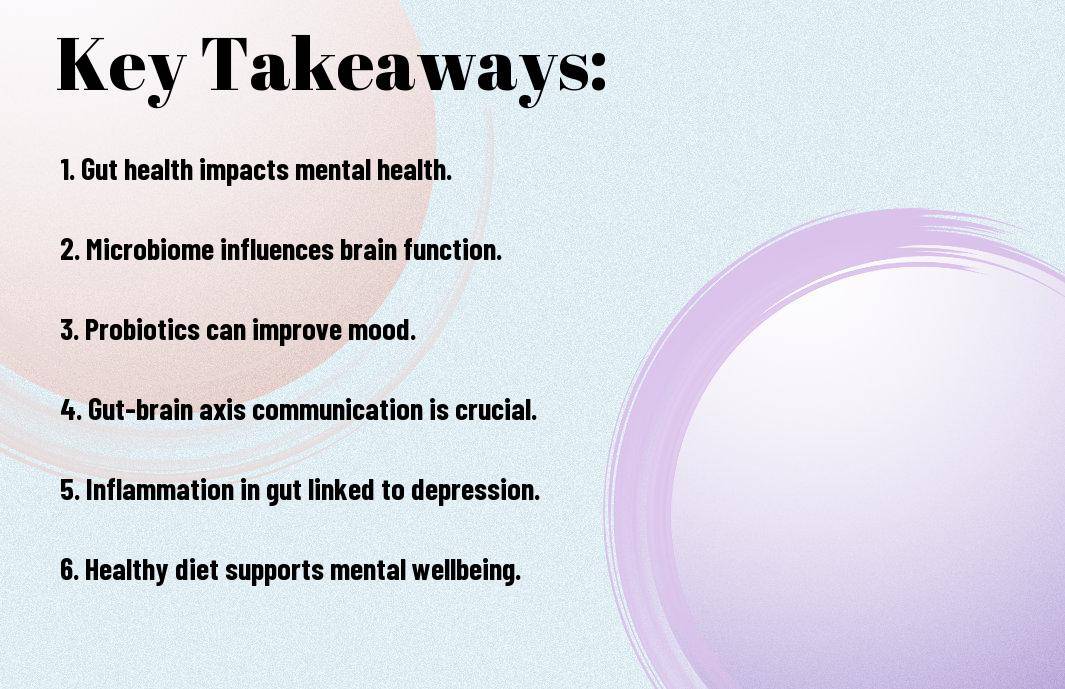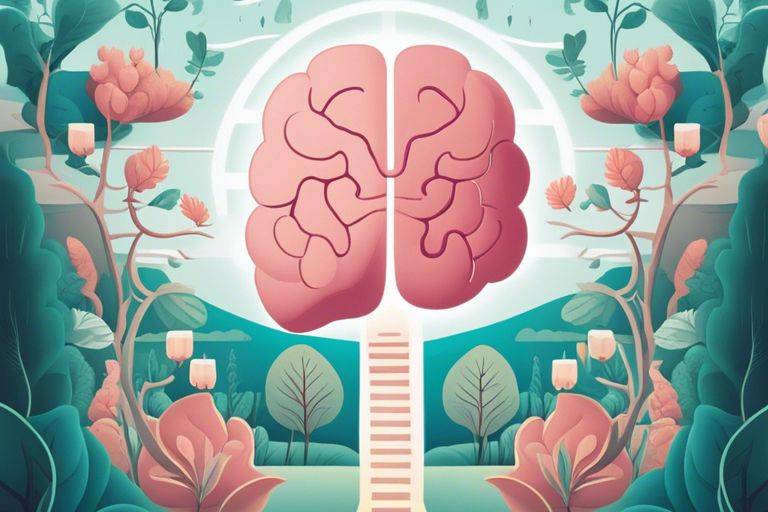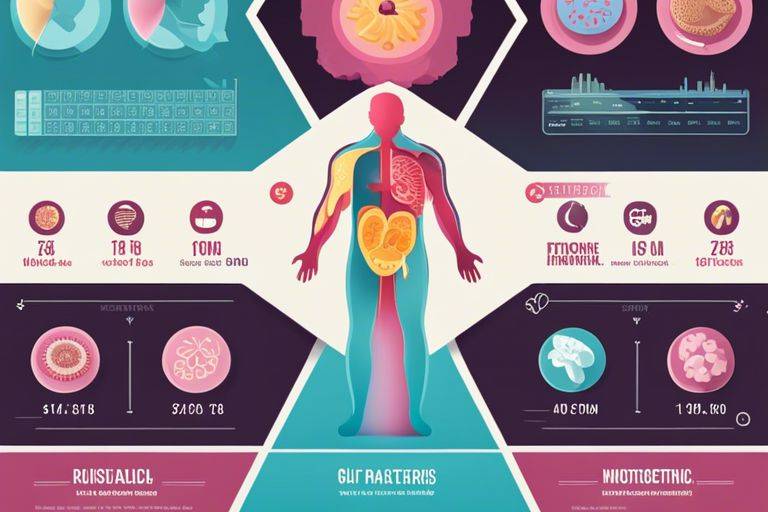Over the years, research has increasingly shown the complex and intriguing link between our gut health and mental wellbeing. It turns out that the microbes in our gut play a crucial role in not just our physical health, but also in our emotional well-being. As I probe into the intricate relationship between these two seemingly unrelated systems, you will be amazed by the impact that taking care of your gut can have on your mental health. Join me as we explore this fascinating connection together!
Key Takeaways:
- Gut-Brain Axis: There is a bi-directional communication pathway between the gut and the brain called the gut-brain axis, showing how gut health can impact mental well-being.
- Microbiome: The gut is home to trillions of beneficial bacteria that play a crucial role in maintaining overall health, including mental health.
- Probiotics: Consuming probiotics can help maintain a healthy gut microbiome, potentially improving mental well-being.
- Inflammation: Imbalances in gut bacteria can lead to inflammation, which has been linked to mental health disorders such as depression and anxiety.
- Diet: A diet high in fiber, fruits, vegetables, and fermented foods can promote a healthy gut and positively impact mental health.
- Stress: Chronic stress can negatively affect gut health, leading to a disruption in the gut-brain axis and impacting mental well-being.
- Seeking Balance: Maintaining a healthy gut through good nutrition, stress management, and probiotic supplementation can support mental well-being.

The Gut-Brain Axis
The Microbiome’s Influence on Brain Function
Before entering into the intricate connection between the gut and the brain, it’s crucial to understand how the gut microbiome affects brain function. Your gut is home to trillions of bacteria that play a pivotal role in producing neurotransmitters like serotonin, which impacts your mood and mental wellbeing.
The Vagus Nerve: A Key Communication Channel
With the gut and brain communicating bidirectionally through the gut-brain axis, the vagus nerve emerges as a vital communication channel. This nerve serves as a direct line of interaction, allowing signals to flow between the gut and brain in real-time, influencing everything from mood to immune responses.
Brain – This vital nerve not only transmits messages from the gut to the brain but also plays a significant role in regulating inflammation and stress responses. Moreover, studies have shown that stimulating the vagus nerve can alleviate symptoms of depression and anxiety, underscoring its profound impact on your mental wellbeing.

The Impact of Gut Health on Mental Wellbeing
There’s a significant connection between gut health and mental wellbeing. According to The Gut-Brain Connection: Understanding How Gut Health…, the state of our gut can have a profound impact on our mental health.
Anxiety and Depression: The Gut Connection
To understand how gut health affects mental wellbeing, we must first explore the link between anxiety, depression, and the gut. Research suggests that imbalances in gut bacteria can contribute to the development of these mental health conditions.
The Role of Gut Bacteria in Mood Regulation
Role Gut bacteria play a crucial role in regulating mood. These microorganisms produce neurotransmitters like serotonin, the “feel-good” hormone, influencing our emotional state and mental health.
Connection: The delicate balance of gut bacteria is important for maintaining a healthy mood and preventing conditions like anxiety and depression.
Inflammation and Oxidative Stress: The Silent Contributors
Oxidative Chronic inflammation and oxidative stress can silently impact mental wellbeing. These conditions, often stemming from poor gut health, can lead to mood disorders and cognitive difficulties.
Contributors: Chronic inflammation and oxidative stress are silent contributors to mental health issues, emphasizing the importance of a healthy gut for overall well-being.
By focusing on nurturing our gut health, we can positively influence our mental state and overall quality of life. Keep in mind, a healthy gut equals a happy mind!

The Gut-Brain Axis in Action
Your Gut-Brain Connection: What It Is, Mental Health, and Diet is a fascinating interplay between your gut and brain that influences your mental wellbeing. Understanding how this axis works can shed light on the profound impact gut health has on mental health.
The Gut-Instinct Connection: How Gut Health Affects Decision-Making
The gut-instinct connection illuminates how the state of your gut can influence your decision-making processes. Research suggests that a healthy gut flora can positively impact neurotransmitter production, affecting your mood and cognitive functions, leading to better decision-making abilities.
The Gut-Sleep Connection: The Impact of Gut Health on Sleep Quality
One Connection between gut health and sleep quality lies in the gut’s role in producing neurotransmitters like serotonin and melatonin, crucial for regulating sleep cycles. A healthy gut contributes to the synthesis of these sleep-inducing chemicals, ensuring improved sleep quality and overall well-being.
Nutrition and Gut Health
After researching the topic of gut health and mental wellbeing, I found a great resource on How to Improve Your Gut Health and Mental Health. This connection between nutrition and gut health is fascinating and crucial for overall well-being.
The Importance of Fiber in Gut Health
Importance: Including **fiber** in your diet is crucial for maintaining a healthy gut. **Fiber** acts as food for the good bacteria in your gut, promoting their growth and diversity. This, in turn, helps to improve digestion and prevent gastrointestinal issues.
The Role of Omega-3 Fatty Acids in Reducing Inflammation
Importance: **Omega-3 fatty acids** play a vital role in reducing inflammation in the body, including the gut. By incorporating sources of **omega-3s** like fatty fish, flaxseeds, and walnuts into your diet, you can help maintain a healthy gut environment and support overall well-being.
Health: **Omega-3 fatty acids** are known for their anti-inflammatory properties, which can help protect the gut lining and reduce the risk of conditions like inflammatory bowel disease. Including **omega-3s** in your diet can also support brain health and improve mood.
Probiotics and Prebiotics: The Dynamic Duo of Gut Health
Fatty: **Probiotics** are beneficial bacteria that can help restore balance in your gut microbiome, while **prebiotics** are a type of fiber that feeds these beneficial bacteria. Including both **probiotics** and **prebiotics** in your diet can help improve gut health and overall well-being.
Acids: Incorporating **probiotic-rich foods** like yogurt, kefir, sauerkraut, and **prebiotic foods** like garlic, onion, and bananas into your diet can help promote a diverse and healthy gut microbiome. This balance of **probiotics** and **prebiotics** is crucial for optimal gut health and mental well-being.
Lifestyle Factors and Gut Health
For optimal gut health, it’s vital to consider various lifestyle factors that can influence the balance of your gut microbiome. Factors such as exercise, stress management, and exposure to environmental toxins all play a crucial role in the health of your gut.
Exercise and Gut Health: The Surprising Connection
The relationship between exercise and gut health may come as a surprise to many. Regular physical activity not only benefits your overall well-being but also has a positive impact on the diversity and abundance of beneficial gut bacteria.
Stress Management and Gut Health: The Mind-Body Connection
Exercise plays a significant role in stress management and its impact on gut health. High levels of stress can disrupt the balance of your gut microbiome, leading to digestive issues and impacting your mental well-being.
Health
In the matter of stress management and gut health, it’s crucial to find effective strategies to cope with daily stressors. Practices such as mindfulness meditation, deep breathing exercises, and regular physical activity can help reduce stress levels and promote a healthy gut microbiome.
The Impact of Environmental Toxins on Gut Health
One of the lesser-known factors that can influence gut health is environmental toxins. Exposure to pollutants, pesticides, and other toxins in our environment can disrupt the delicate balance of our gut microbiome, leading to inflammation and various health issues.
Plus
It’s important to minimize your exposure to environmental toxins by choosing organic produce, using natural cleaning products, and filtering your water. Additionally, supporting your body’s natural detoxification processes through a healthy diet rich in antioxidants can help mitigate the negative effects of environmental toxins on your gut health.

Gut Health and Mental Health Disorders
Gut Health and Anxiety Disorders
Keep in mind that the gut-brain axis plays a significant role in anxiety disorders. Research suggests that an imbalance in gut microbiota can contribute to the development and exacerbation of anxiety symptoms. By maintaining a healthy gut through a balanced diet and probiotics, you can positively impact your mental well-being.
Gut Health and Depression: The Complex Relationship
Disorders in gut health have been linked to depression, showcasing a complex relationship between the two. Studies have shown that individuals with depression often have altered gut microbiota composition, which could affect serotonin levels in the brain. This highlights the importance of nurturing your gut health as a part of managing depressive symptoms.
Depression: Depression has been associated with dysbiosis in the gut, leading to inflammation and impaired neurotransmitter function. By prioritizing gut health, you may alleviate some symptoms of depression and improve your overall mental well-being.
Gut Health and Bipolar Disorder: New Research Findings
One intriguing area of research is exploring the connection between gut health and bipolar disorder. Recent studies have indicated that individuals with bipolar disorder may have distinct gut microbiota profiles. This opens up new possibilities for potential interventions targeting gut health to supplement traditional treatments for bipolar disorder.
Anxiety: Individuals with anxiety disorders may experience worsened symptoms due to gut dysbiosis, leading to a cycle of increased anxiety. By addressing gut health, you can help break this cycle and improve your mental health.
Conclusion
Ultimately, the connection between gut health and mental wellbeing is a fascinating and complex topic that highlights the intricate relationship between our digestive system and our brain. By understanding how the two are interconnected, you can make informed choices about your diet and lifestyle to support both your physical and mental health. Note, taking care of your gut may positively impact your overall well-being and lead to a happier, healthier you.
FAQ
Q: What is the connection between gut health and mental wellbeing?
A: The connection between gut health and mental wellbeing is known as the gut-brain axis, which involves bidirectional communication between the gut and the brain through the nervous system, immune system, and hormonal pathways.
Q: How does gut health impact mental health?
A: Poor gut health can lead to inflammation, imbalance in gut bacteria, and impaired gut function, which have been linked to mental health conditions such as depression, anxiety, and stress.
Q: What are some signs of an unhealthy gut?
A: Symptoms of an unhealthy gut include bloating, gas, diarrhea, constipation, food intolerances, skin issues, fatigue, and mood disturbances.
Q: How can I improve my gut health?
A: Ways to improve gut health include eating a balanced diet rich in fiber, probiotics, and prebiotics, staying hydrated, managing stress, getting enough sleep, and avoiding foods that may irritate the gut.
Q: Can probiotics help with mental health?
A: Probiotics are beneficial bacteria that can help improve gut health by restoring balance in the gut microbiome, which may have positive effects on mental health by reducing inflammation and promoting the production of neurotransmitters like serotonin.
Q: Are there specific foods that support gut health and mental wellbeing?
A: Foods rich in fiber, such as fruits, vegetables, whole grains, and legumes, are good for gut health. Additionally, fermented foods like yogurt, kefir, sauerkraut, and kimchi contain probiotics that support a healthy gut and may benefit mental wellbeing.
Q: How long does it take to see improvements in mental wellbeing by improving gut health?
A: The timeline for seeing improvements in mental wellbeing by improving gut health varies from person to person. Some individuals may notice positive changes in mood and cognitive function within a few weeks, while others may take longer to experience benefits. Consistency in healthy habits is key to long-term improvements.



